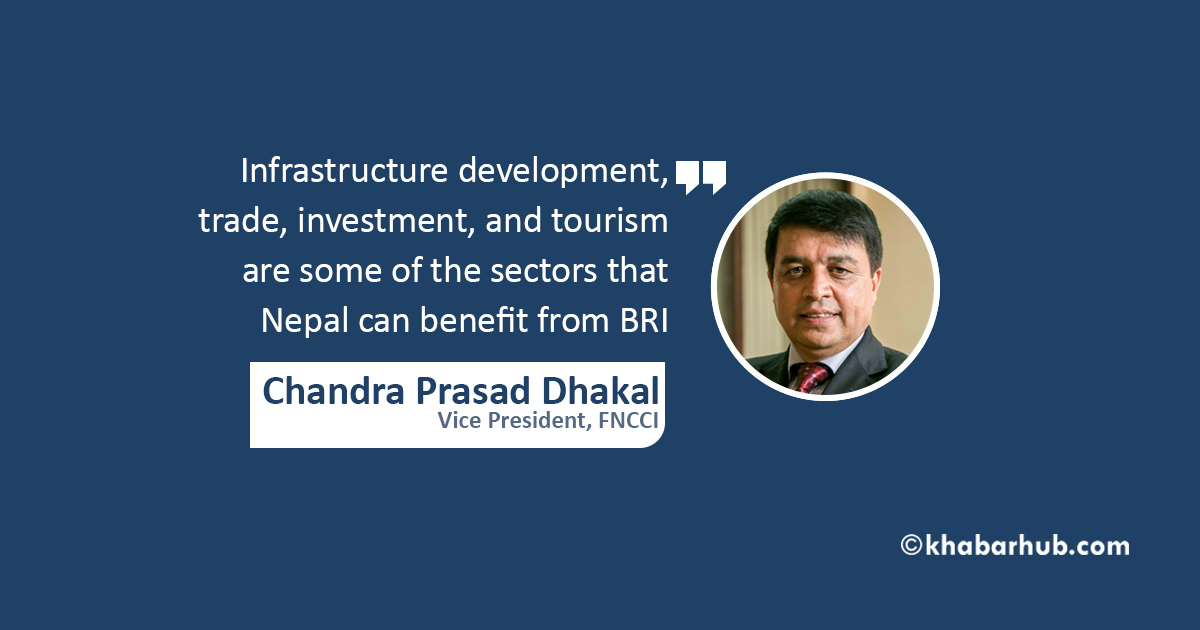0%

Belt and Road Initiative (BRI), introduced by Chinese President Xi Jinping, has been one of the largest and ambitious projects of the 21st century. This project aims at connecting over 60 countries of Asia, Africa and Europe.
While calculating the population of the project area, it covers more than 64 percent of the world’s total population. Likewise, it also covers more than 40 percent of the world’s total GDP. Nepal should feel proud to have become a member of this project.
Chinese people often remember former Chinese President Deng Xiaoping for his contribution in making China as the world’s second-largest economy. It was because of his Open China Policy in 1978 that led China to the current position.
Many people assume BRI as road connectivity. However, it has multiple network and connectivity such as rail, road, sea, air, pipeline, energy grid, transmission and internet.
After China opened to the world, investors across the world started to pour in. It also expanded its investment to various parts of the world. Chinese investment in foreign countries has increased of late amounting to more than 160 million US$ by the end of 2016.
China’s new initiative, popularly known as BRI, has remained in the limelight due to the economic progress made by China in recent years.
BRI is one of the network and gateway projects that would not only connect the world but also share its economic and development benefits to different countries of the world.
Many people assume BRI as road connectivity. However, it has multiple network and connectivity such as rail, road, sea, air, pipeline, energy grid, transmission and internet.
In the context of a landlocked country like Nepal, road connectivity is of prime importance. The road is the first and foremost basic infrastructure for our connectivity, which will benefit both the countries.
The widely anticipated rail connectivity of Nepal also falls under this project. However, due to the difficult geographical terrain on the northern part of Nepal, the physical connectivity between the two countries seem challenging.
What should not be forgotten is that road connectivity is the only means for Nepal to take maximum benefits from China’s development and prosperity. It would also help get more Chinese tourists besides attracting more Chinese investment in Nepal.
It is high time that Nepal discussed and researched how it can benefit from BRI since the benefits from the project purely depend on the modality Nepal chooses.
To reiterate, it is Nepal’s opportunity to have two large and flourishing neighbors like India and China. They can be a market for Nepali products as well. Therefore, Nepal needs to show its willingness and initiation so as to reap the benefits from them.
Infrastructure development, trade, investment, and tourism are some of the sectors that Nepal can benefit from BRI.
Since millions of Chinese tourists go to different countries annually, and as Nepal is observing Visit Nepal 2020, inviting a few lakh tourists in Nepal would benefit to promote Nepal’s tourism sector.
China can be seen as a ‘sea of prosperity’ for a country like Nepal. However, it depends on Nepal how much benefit it can take from China’s progress. Therefore, Nepal needs to set its own road to prosperity.
To reiterate, it is Nepal’s opportunity to have two large and flourishing neighbors like India and China. They can be a market for Nepali products as well. Therefore, Nepal needs to show its willingness and initiation so as to reap the benefits from them.
Nepal must also devise an effective modality to build the economic foundation for prosperous Nepal under BRI modality. This will be a win-win modality for both Nepal and China.
As a representative of the FNCCI, the umbrella organization of the business community in Nepal, I would like to urge Nepal’s political leaders to present their views on taking maximum benefits from the BRI and make a common national strategy accordingly.
I would also like to request the government to take private sector together in its mission of prosperity. The FNCCI has always remained positive to BRI and pushing the government to take maximum benefits from the project.
Merely signing documents will not yield fruits. Nepal has to devise programs of national interest, and plan to make this country a transit point in South Asia.
Recently, Chinese Foreign Minister Wang Yi, who was in Kathmandu, trekked to Chandragiri where he stayed there for more than four hours. He appreciated the beauty and landscape of the hill station saying Nepal, being a mountainous country, surely has several hills like Chandragiri.
Nepali people are, in fact, fortunate to be the citizens of such a beautiful country.
(Dhakal is the Vice President of the Federation of Nepalese Chambers of Commerce and Industry. The article is based on his views expressed at a program on BRI in Kathmandu.)
Views expressed in this article are the author’s own and do not necessarily reflect the stance of Khabarhub.